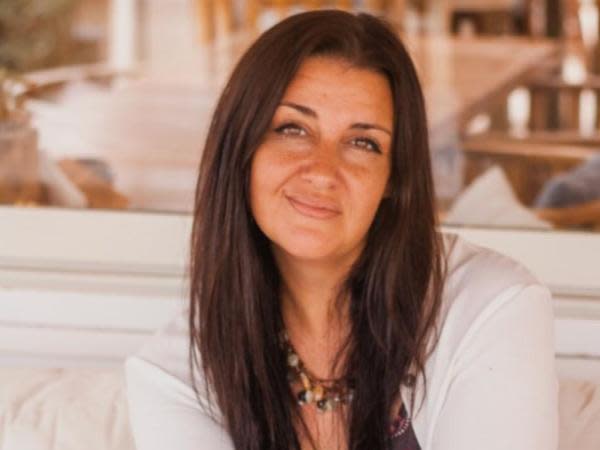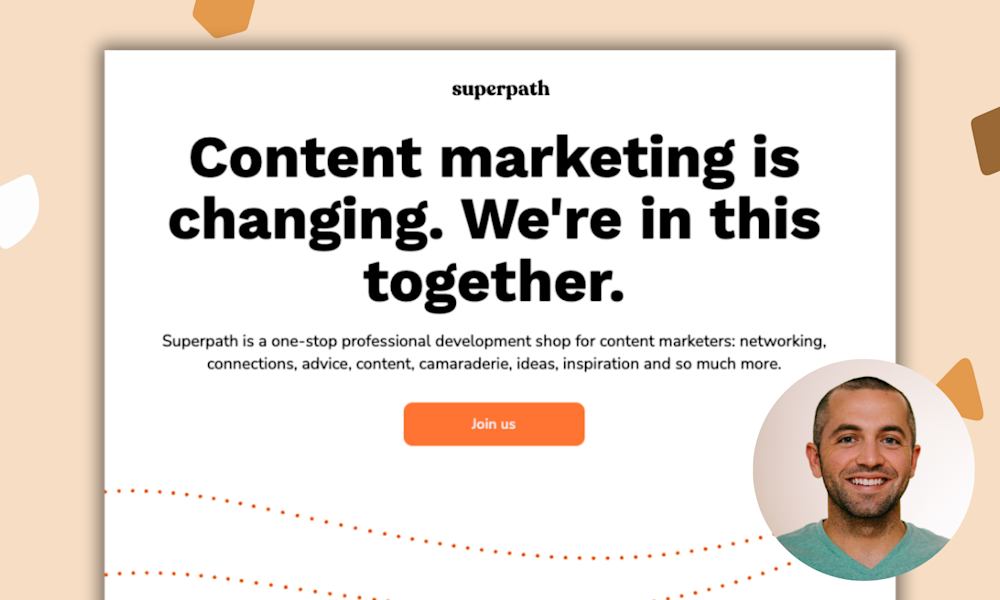$15,000 in two weeks.
That’s how much Jay Acunzo made on his online course launch with Podia.
It didn’t happen overnight — and it wasn’t always a smooth ride.
Jay went from a fully-booked public speaker to canceled events as the world shut down in 2020. Like too many people, he found his primary source of income threatened by the pandemic. He knew he needed to adapt to make up the difference — and fast.
So he did. Jay used his expertise as a showrunner and storyteller to launch three profitable digital products: an online course, an intensive workshop, and a membership group.
Today, things are looking up for Jay.
“I earn six figures through my online projects,” he explains. “I could stop some of the client services work that I’m doing and still afford my life as it currently is.”
Here’s how Jay adapted his business to the online-only world, where Podia fits in, and what he has to teach us about making what matters — with a tidy profit along the way.
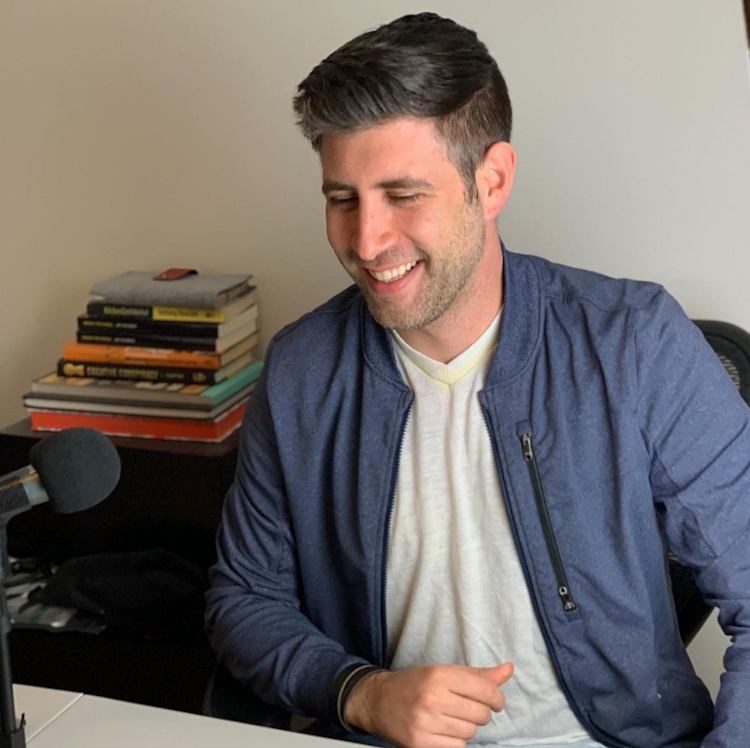
How Jay embarked on his entrepreneurial journey
Like so many solopreneurs and entrepreneurs, Jay started out in a 9-to-5 role that didn’t feel right for him.
Working in sales at Google, he wasn’t satisfied with the work, but learned “that creativity and business can be harmonious. There’s a lot of friction, but it can work.”
With that lesson in mind, Jay moved from sales to content marketing.
“I got a job at a startup in content marketing instead of sales, and I never looked back,” Jay recounts. “So I’ve kind of grown up in content marketing, mostly for tech companies, and started doing a lot of blogging and public speaking around these subjects in the industry.”
As a content creator, Jay was inspired by business and storytelling as a force for good. He wanted to create brand content that made a real difference.
In 2016, that love of storytelling led Jay to his first showrunning experience.
“When I was working for a venture capital firm running their brand, I was given the chance to host their podcast, which I called Traction,” Jay says. “It was my first foray into audio and long-form storytelling and showrunning. And I was hooked.”
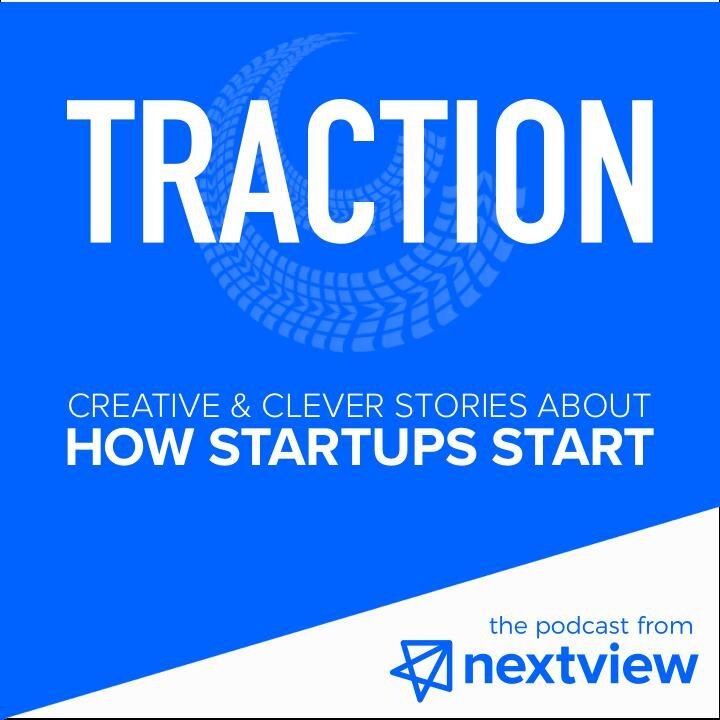
Jay fell in love with podcasting and decided to launch a show of his own, Unthinkable.
At the very same time, another opportunity knocked:
“A friend of mine reached out and said, ‘I’m starting a management company for aspiring business speakers and authors. Would you be my guinea pig?’ And so I said yes.”
Jay found himself working full-time at the venture capital firm, developing his public speaking platform, and creating Unthinkable all at the same time.
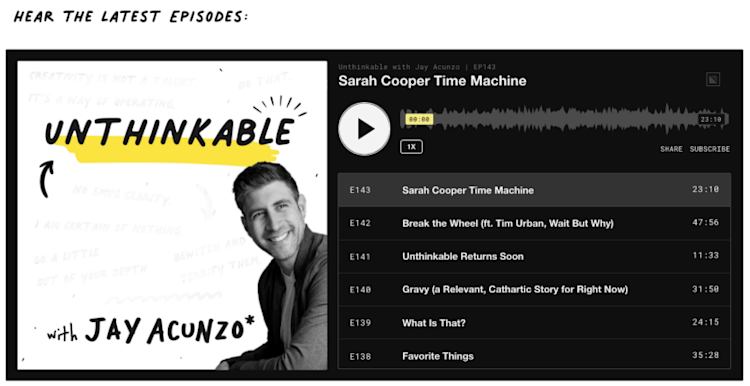
Then he began to transition from a full-time job to full-time entrepreneurship.
“When it became too unwieldy to do all three, I was able to move from full-time job to part-time job to then full-time entrepreneurial path,” Jay describes. “So I essentially mitigated the risk and had real revenue before leaving my job to pursue this stuff full-time.”
As a full-time entrepreneur, Jay built a successful business with two components:
-
Client services helping brands launch podcasts of their own (including Podia’s podcast).
-
Public speaking at in-person events.
Then, 2020 happened. And like it did for so many people, everything changed for Jay.
Adapting to an online-only world with help from Podia
As the world shut down during the pandemic, Jay found his business turned upside down.
“Three years of hard work building a six-figure speaking business came crashing down in about two months where booked gigs went on pause or pushed back, leads that were about to close decided to not have those events anymore, and new leads weren’t coming in.”
Jay knew he needed to adapt his public speaking and client services businesses to the new, online-only reality. He already had an audience, but in-person events and consulting budgets were off the table.
So, he decided to turn his showrunning expertise and storytelling skills into digital products.
“I decided I would create an online workshop for podcasters. So rather than be a hired host, and producer, and director of the show, I could teach show running,” Jay explains.
He created Marketing Showrunners and The Showrunner Sessions, an interactive, cohort-based online workshop.
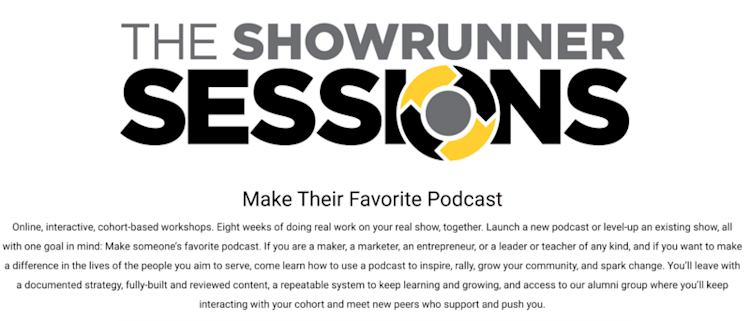
The workshops drew from “all the systems, processes, and frameworks I had been using for clients,” he continues. “So now, I was still attracting people who wanted to make shows, but pointing them to a different product.”
Jay ran two eight-week intensives in 2020, and both were wildly successful. But they were a big commitment for the cohort members and Jay alike.
He wanted to offer a more scalable, affordable, and lower-commitment option. So he launched an online course on Podia.
Growable Shows is “an on-demand course for making better podcasts or video series to support your business, your cause, and your community.”
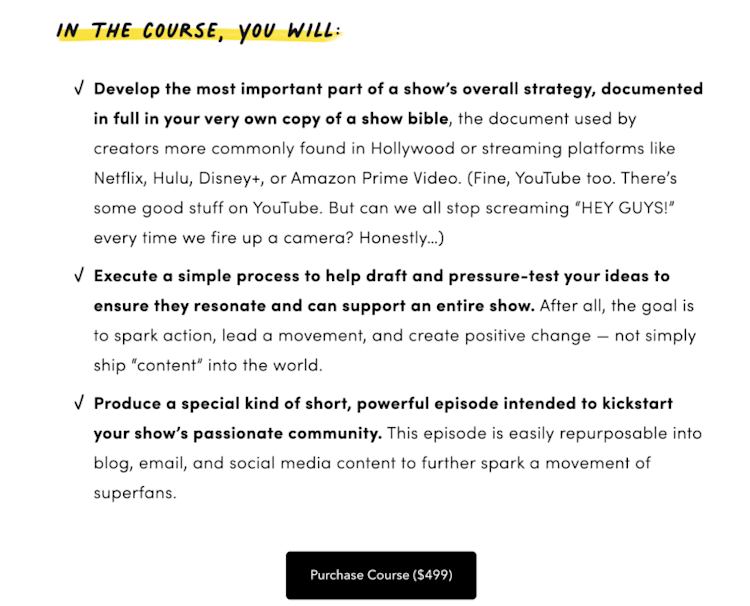
“I took a lot of the lessons from some of the most pressing issues addressed in the workshop and created an on-demand course,” Jay elaborates.
“My hope is that the course is not a replacement for the workshop for many people, but a way to ease into the higher-priced workshop or the ongoing membership group.”
Within the first two weeks of launching Growable Shows on Podia, Jay made $15,000. And because it brings in passive income, it’s his most profitable product.
“Because my public speaking business was in shambles, the work I did through Podia’s platform in selling things like courses saved my entire year.”
(See how easy it is to sell digital products on your own site with Podia. Sign up for your 30-day free trial now.)
But while the course may be his most profitable product, the most popular digital product Jay offers is his membership group, Make What Matters, which he also sells through Podia.
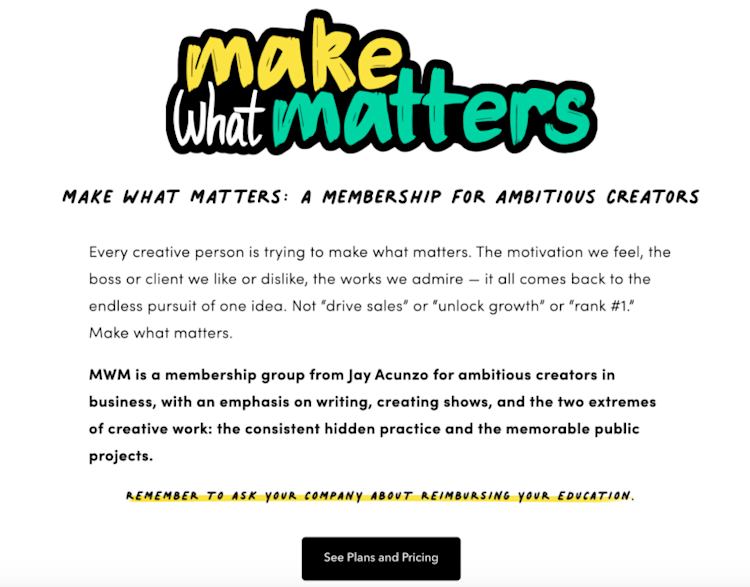
The membership group is a community for creators looking to create meaningful content and connect with one another. When it comes to his online course vs. membership site, Jay believes that accountability and connection make the latter more valuable.
“We live in an era where knowledge and access to people who are knowledgeable is a commodity. It’s everywhere for free.
The things that are scarce are connection, prestige, accountability. These are the things that people choose to spend meaningful money on and should be paying for, not knowledge.
When you sell a knowledge product, you’re trying to help those people feel some kind of connection and accountability. Those are the things people actually pay for. And I’m seeing that more fully with my membership group.”
When he began creating those knowledge products, Jay discovered Podia through fellow creators. He knew that a platform built for creators (and by creators) was the right choice for his business and his audience.
“Podia is like the Shopify for online creators who sell information instead of a physical good,” he describes. With Podia, Jay can host, launch, and sell those knowledge products all from one dashboard.
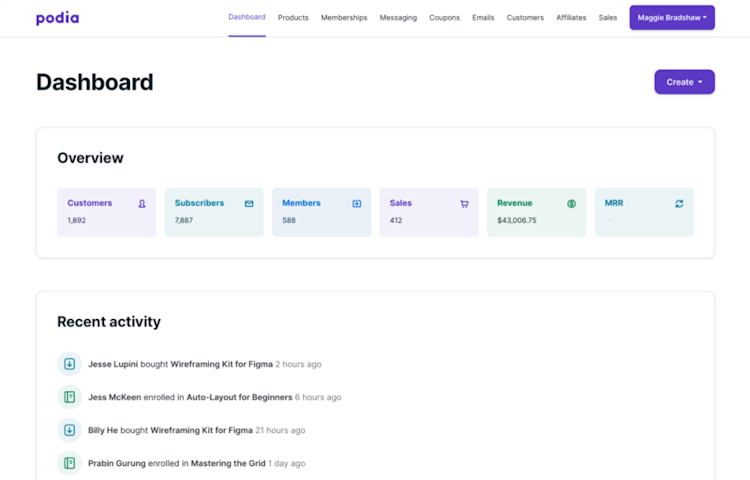
Podia also makes it easy for Jay to add new products to his website, no coding necessary. Plus, Podia’s checkout integrates directly into Jay’s site for a seamless user experience, which lets Jay’s entrepreneur branding shine.
“Having spent all this time and money and energy building out a beautiful personal website, I love integrating Podia into the existing brand site that I built. It feels like it’s my own, even though it’s Podia. And I love that.”
When it comes to growing his online business, “make what matters” is more than just a membership site name. It’s how Jay strives to lead his life.
Helping people “make what matters” every day
Across his digital products, shows, and books, Jay’s products and teaching style reflect his focus on connection, community, and going beyond sharing knowledge.
“I want to help people essentially create things that are more meaningful. There’s a lot of commodity work and commodity content. So I like to say, ‘don’t market more, matter more.’”
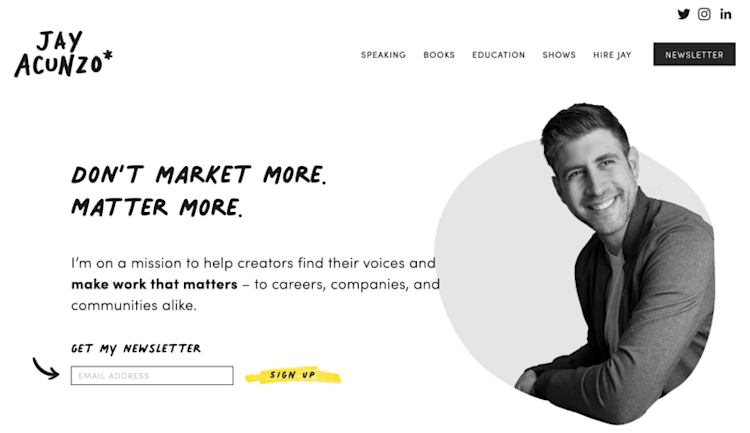
What does that look like in Jay’s day-to-day life?
Everything he does relates to his overarching mission — his “why”.
“With the new business I have, where it’s educational products, a membership group, shows, content, and my newsletter, it all fits together nicely in one flow underneath that mission of helping people make what matters.”
Jay’s “why” is “helping people make what matters”. From there, he looks at the “how” — for example, demystifying the creative process — and the “what,” meaning the actions he’ll take to get there:
-
“I could demystify the creative process through a single post to my member group or a monthly live session.
-
I can write a story in my weekly newsletter to demystify the creative process.
-
I could demystify the creative process through my podcast, by breaking down great podcasts with the host of those shows.”
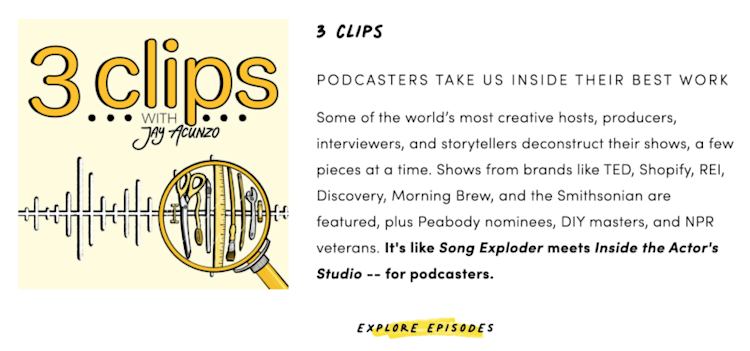
Running his own business isn’t always a walk in the park. “Being an entrepreneur has been more taxing on my personal life than being an in-house employee. It’s just the reality many of us go through,” he shares.
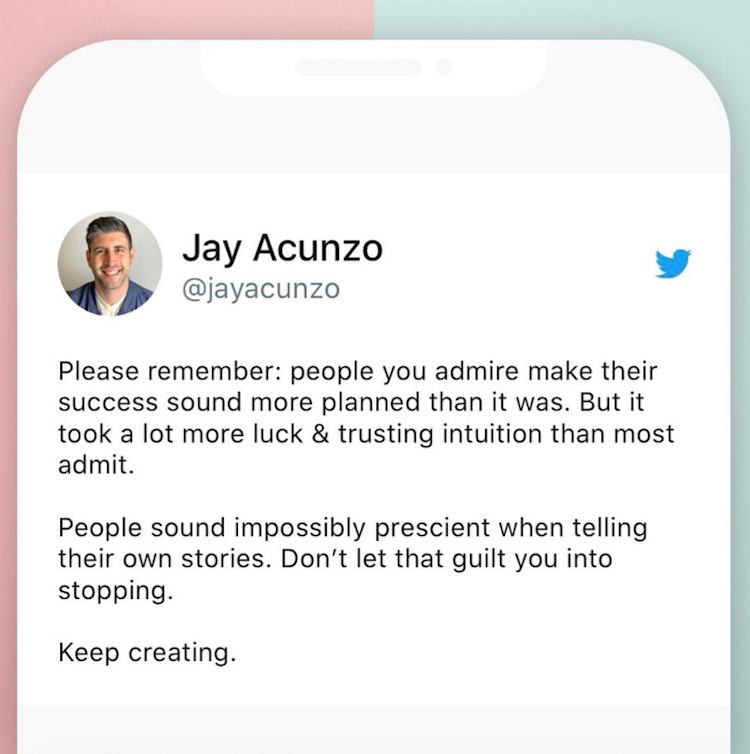
But keeping everything he does aligned with his mission helps Jay prioritize the tasks that matter most for him and his audience.
“My business is much more aligned where I don’t have to stretch myself across other people’s problems,” Jay says. “I can focus on one problem and one mission and have different ways and different experiments to try and solve them.”
Jay recommends that fellow entrepreneurs and aspiring creators do the same.
Jay’s advice for fellow creators
As a successful entrepreneur who has adapted to a new, online-only reality, Jay wants others to know that they can do the same — they just need to focus on their mission.
“The thing that’s helped most with this transition is to be crystal clear on the mission that I have first, the products and content I have second,” Jay reveals. “Understanding what I’m all about is making it a lot easier for people to be all about my projects.”
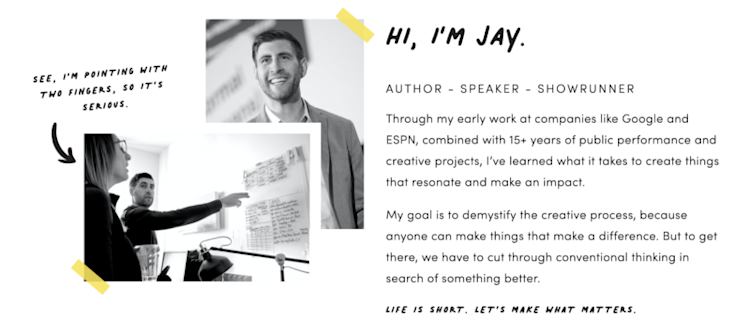
Whether you’re taking your side-hustle full-time or launching a new online business, Jay has some advice on making the most of your entrepreneurial journey and avoid burnout.
“Find the things that give you energy, as opposed to draining you of energy, and get rid of the things that drain you of energy. For example, hiring freelancers who do those things better than you and love them,” Jay advises.
“Because when you show up, at the end of the day, to your family, to your friends, you want to show up as a more energized person. If you’re drained, then that attitude can leak into your personal life.”
And finally, Jay recommends finding tools that help you stay aligned with your mission and focus on what matters.
“The most value Podia has provided me is putting me on the path I actually want to be on,” he shares.
“In having seen what Podia is doing and the way they’re trying to teach, evangelize creativity, and earning a living on your craft, they’re not just building tools for creators, they are creators. And I really love that.”
Try Podia free for 30 days. We can't wait to see what you make.
